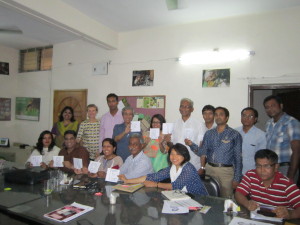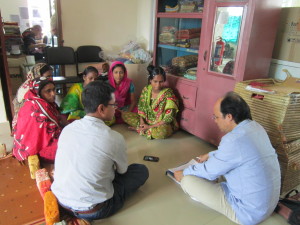Fair Trade is a movement that has gained momentum over the last several years, and its principles it has excited for decades. The World Fair Trade Organization (WFTO) has defined 10 Principles of Fair Trade which include: Creating Opportunities for Economically Disadvantaged Producers;Transparency and Accountability; Fair Trading Practices; Payment of a Fair Price; Ensuring no Child Labour and Forced Labour Commitment to Non Discrimination Gender Equity and Women’s Economic Empowerment, and Freedom of Association; Ensuring Good Working Conditions; Providing Capacity Building; Promoting Fair Trade and; Respect for the Environment.
We were curious to learn more about the realities of implementing these principles in the field and sat down with Swapan Kumar Das, Executive Director of Prokritee and Chairperson of ECOTA, the Fair Trade Forum of Bangladesh, to hear his thoughts.
SD: ECOTA was founded in the mid-1990s by a group of people working with various NGO’s (including Mennonite Central Committee, Oxfam and Caritas) who all had social business projects and wanted a network that supported their work. Over time the network grew into an association. We currently have 18 member organizations including the second largest handicraft organization in Bangladesh.
When ECOTA was first formed, the handicraft sector was fairly new to world of business and we facilitated several trainings and courses on accounting, cost pricing and how to manage a small business. Over time members began to interact directly with the WFTO Asia or the main offices directly and we’ve had to think about our short and long term goals. As a group we serve as a forum for organizations to share best practices and challenges working in the Fair Trade sector.
AG: How receptive is the general public to the principles of Fair Trade?
SD: At the moment, it’s really only organizations involved in this work that are aware of the principles of Fair Trade. The general public doesn’t really have much awareness of these principles and one has to explain the benefits.
Organizations who work in the craft industry have seen the benefits not only for their artisans and producers but financially for the organization too. As the Fair Trade network is large, there is a consistency in orders that enables their organizations to be sustainable. It is also easier for them to deal with Fair Trade buyers versus wholesale traders, who are only interested in volume.

SD: When thinking about running an ethical business, compliance is very important. It is an additional a cost to an organization and more often than not, private organizations are just focussed on profit. But social and ethical business need to ensure compliances are met in order to be sustainable. So they have to be careful about maintaining certain standards. Fair Trade organizations have to have certain systems and standards in place and have to maintain these standards. Once these systems and standards have been established, one has to educate the staff and artisans too, to ensure they understand and meet the various compliances.
One of the biggest challenges ensuring that the entire supply chain adheres to Fair Trade principles. In a country like Bangladesh for example, one can’t always guarantee that a cultivator of raw materials pay fair wages to their employees, or that their materials are organic.
Another challenge is educating the artisans so that they understand what means to run an ethical business. Sometimes, when they face challenges in production they feel uncomfortable telling their buyers that there will be a delay. Instead, they’ll blame it on the weather and say that they are experiencing heavy rainfall, when that isn’t the case. We need to educate the artisans and producers groups around communicating with transparency too.
AG: How receptive is the WFTO to the context in which you operate and the challenges you face?
SD: Overall, the WFTO does try to work with the realities and challenges we face but sometimes it involves a lot of negotiation. For example, the WFTO places a lot of importance of ensuring the artisans are paid a minimum wage and in some cases, like with Prokritee, asks organizations to raise the minimum wage. There isn’t a lot of clarity around that term in Bangladesh as the minimum wage is applicable only for government workers. When applying it to artisans and producers in rural areas, this doesn’t really work. In order to raise the minimum wage, one has to raise the price of the product too. The realities in rural areas are different – they don’t pay for rent or electricity and in general they have food security. So there are big differences for workers in an urban and rural setting. Because it is primarily an agricultural economy, when there no crops to look after, there is no work, and the workers become idle. At Prokritee we guarantee a monthly income through craft production.
We have been in discussions with the WFTO to have two separate minimum wages in Bangladesh, one for the urban areas and one for rural areas. We are still in conversations with them and are trying to figure it out. We’ve been looking at measurements such as a food basket with a standard sized family and trying to base calculations on that and are also looking at best practices from other countries too. Prokritee offers retirement and medical benefits too and so we want to take that into consideration when calculating the minimum wage.
What we need to keep in mind is that in order to raise the minimum wage, we have to raise the price of the craft products. Though our buyers are Fair Trade organizations, not all their customers are, as in, not everyone who walks into their shop is buying a product because it is Fair Trade. One of our Fair Trade buyers in Canada shared with us that only 30% of their customers are ‘Fair Trade’ customers. That means the majority of customers are looking at the design and trendiness of the product. So we have to take that into consideration too.
AG: What advice would you have for other organizations that are considering getting Fair Trade certification?

AG: What can we expect from ECOTA in 2016?
SD: At ECOTA we would like to build stronger ties between the Fair Trade organizations in the country and interact more with both the Asian and global body of the WFTO.
As Executive Director of Prokritee we’d like to make it a model fair trade organization in the country and share best practices with other organizations.



